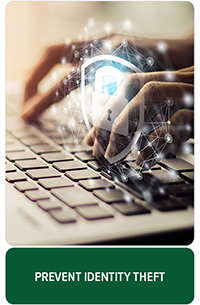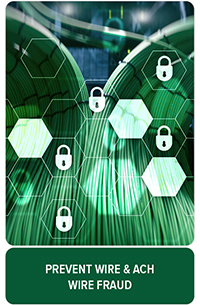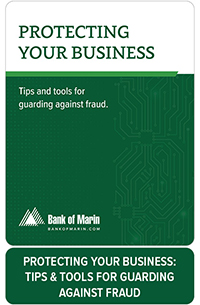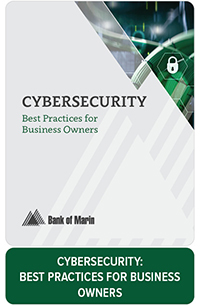Fraud Prevention Resource Center
It Takes Two – Your Bank and You
Bank of Marin is dedicated to keeping your finances safe and secure. We’ve compiled information to help you expand your knowledge, protect your identity, and secure your finances. Please read through this information to learn how to protect yourself and what tools are available from the Bank.
Remember we always recommend that you call us and other appropriate agencies when there is an emergency related to your bank accounts. Bank of Marin will never ask for your debit card PIN or digital banking password.
Fraud Prevention tip sheets:
Click on the topic below to read or download.
 |
 |
 |
 |
 |
Common Fraud-Related Terms Defined: What do all those terms mean?
Malware (also known as a Virus). Short for “malicious software,” and refers to software developed by cybercriminals (often called “hackers”) to steal data and damage or destroy computers and computer systems.
Spyware. A type of malware installed on computers or cellphones to track your actions and/or collect information without your knowledge. Some spyware can change computer settings to send you to a malicious website instead of the one you intended to visit.
Cybercrime. Criminal activity carried out by means of computers or the internet.
Cybercriminal (often called “hackers”). One who engages in criminal activity by means of computers or the internet / uses the Internet to illegally break into computers.
Social Engineering. Methods cybercriminals use to get victims to take some sort of questionable action, often involving a breach of security, the sending of money, or giving up private information. These actions tend to go against our better judgment and defy common sense. However, by manipulating our emotions – anger, fear, and love, scammers can get us to stop thinking rationally and start acting on impulse without regard to what we’re actually doing. To put it simply, if cybercriminals use malware and viruses to hack our computers, then social engineering is how they hack our minds.
Phishing Attack. When a cybercriminal sends emails that trick users into disclosing sensitive information or downloading malware onto their computer or internet-equipped mobile device.
Identity Theft and Online Impersonation. These two terms go hand-in-hand– Identity theft is the fraudulent acquisition and use of a person’s private identifying information, usually for financial gain. This is followed by one of the most commonly committed cybercrimes in existence when someone maliciously uses another person’s online identity to gain financial benefits. This could include asking family members and friends for money, opening a bank account, or getting a loan in their name.
Business Fraud Prevention Tools: The best way to avoid fraud is to stop it before it occurs.
We offer these treasury management tools to help safeguard your accounts.
ACH Positive Pay Fraud Service
This fraud prevention tool reduces the risk of ACH fraud by stopping unauthorized ACH debits from posting to your account. Using pre-authorization criteria that you establish, this system determines which ACH transactions are allowed to automatically pay, and which unexpected ACH transactions will require your timely review and specific instructions before they post to your account.
Check Positive Pay Fraud Service
An online system that helps reduce the risk of check fraud by allowing businesses to monitor their authorized, issued checks compared to those presented for payment at the Bank. It will require your timely review and specific instructions before checks are posted to your account. You can also run reports on paid and outstanding items.
Fraud Reporting Resources: Who to contact if you suspect fraud.
Always carefully monitor your business and personal bank accounts for fraudulent activity. If you ever see anything unusual, immediately contact your local Bank of Marin banker, office or our Customer Support at 1(866) 626-6004.
TO REPORT BUSINESS FRAUD AND SCAMS
If you suspect fraud on your accounts, the first call you should make is to the bank. This could help prevent additional occurrences while we investigate.
File a report with the
- Your local police department
- The FBI or the FBI’s Internet Crimes Complaint Center
- CALIFORNIA ATTORNEY GENERAL’S OFFICE
- FEDERAL TRADE COMMISSION
- BETTER BUSINESS BUREAU
TO REPORT IDENTITY THEFT
Follow these steps as quickly as you can:
- Change any account Personal Identification Numbers (PINs) or passwords.
- Contact the three national credit bureaus and ask them to attach a “fraud alert” to your credit file.
EQUIFAX.COM 1-800-349-9960
EXPERIAN.COM 1-888-397-3742
TRANSUNION.COM 1-888-909-8872
- Contact all your creditors (by phone and in writing) to inform them of the problem.
- Contact the local police. They may be able to act under state consumer protection laws.
ADDITIONAL RESOURCES
If you think your mail has been stolen, file a report with the US Postal Service or call the U.S. Postal Inspection Service hotline at 1-800-372-8347.
Federal Trade Commission (FTC) hotline for consumers to report incidents of identity theft: 1-877-ID-THEFT (1-877-438-4338), or www.identitytheft.gov
Social Security Administration’s Fraud Hotline: 1-800-269-0271
Helpful Travel Tips: Before you go, let us know!
- Notify your local branch, call Bank of Marin Customer Support at (866) 626-6004 or send us a secure email in Digital Banking so access to your debit card and digital banking is not interrupted during your trip.
- Sign up for transaction alerts in Digital Banking to stay informed of your account activity.
- Review and update security preferences in Digital Banking before your departure.
- Take the Bank of Marin Customer Support phone number with you, so if you need us, you can contact us.
WHILE YOU ARE AWAY
- Carry two forms of payment when traveling, such as a debit card and a credit card, in case one of them is not an accepted form of payment.
- When you hand your card to a server or cashier, make sure it is returned in a timely manner.
- Have fun and bring in photos when you return!
Protect Yourself Online
With attacks on personal and financial information becoming more sophisticated and aggressive, now is the time to take action to protect yourself and your business.
